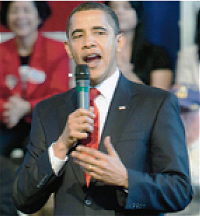| The Quotable Barack Obama |
 |
|
By Troy Senik
Thursday, August 13 2009 |
On Tuesday, President Barack Obama, reeling from growing public opposition to his proposed healthcare reform, took to the stage for a town hall meeting in Portsmouth, New Hampshire. The stated intent of the event was to correct public misperceptions about the president’s proposal. But the outcome spoke more to the plan’s weaknesses than its strengths. Reacting to allegations that the plan’s so-called “public option” would result in government pushing private health insurers out of the market, Obama glibly responded, “… I think private insurers should be able to compete. They do it all the time. I mean, if you think about … UPS and FedEx are doing just fine, right? … It's the Post Office that's always having problems.” Such is the curse of being Barack Obama that when he occasionally stumbles onto truth it militates against his ambitions. His analysis of American postal service is entirely correct. But is noting the dysfunction of a government-run program in comparison to its private-sector competitors a reassuring case to make for an increased government role in healthcare? And is he unaware that the success of UPS and FedEx owes to exceptions to a government monopoly, while his health plan increases Washington’s market power? There’s more at work here than Obama’s shaky grasp of public policy, however. His comments also betray an intellectual insularity from conservatism. In his campaign book-cum-self-help manual, “The Audacity of Hope,” Obama repeatedly emphasizes his respect for the right’s legitimate criticisms of liberalism’s excesses. But how does anyone of such temperament cite the United States Postal Service as an example when it ranks second only to the DMV among conservatism’s anti-government bête noirs? Among the other sedative pieties of the day: “Under the reform we're proposing, if you like your doctor, you can keep your doctor. If you like your health care plan, you can keep your health care plan.” Here Obama’s language obscures more than it explains. For the 164 million Americans who receive health care through their workplace, the decision about whether or not they will keep their coverage is not theirs, but their employer’s. And with proposed legislation making the penalty for employers who don’t provide health care lower than the cost of actually providing that care, the non-partisan Lewin Group has estimated that 88.1 million Americans will be dumped onto the public plan as a result of the perverse incentives. Another choice offering: “And I do think that having a public option as part of [the health care plan] would keep the insurance companies honest, because if they've got a public plan out there that they've got to compete against, as long as it's not being subsidized by taxpayers, then that will give you some sense of what – sort of a good bargain for what basic health care would be.” Leaving aside that passage’s imploding syntax, Obama must once again be either consciously dissembling or dangerously unaware of his plan’s implications. A public plan that isn’t subsidized by taxpayers serves no purpose beyond adding one more provider to a market that already has 1,300. How would one new entrant keep competitors “honest” if it was playing by the same rules? And how can government be both a neutral arbiter of healthcare markets and a market participant? If the public option isn’t subsidized in the form of either money or power, the public option is pointless. Finally, in response to concerns about government rationing health care, Obama said “Right now insurance companies are rationing care. They are basically telling you what's covered and what's not. They're telling you: We'll cover this drug, but we won't cover that drug; you can have this procedure, or, you can't have that procedure. So why is it that people would prefer having insurance companies make those decisions, rather than medical experts and doctors figuring out what are good deals for care and providing that information to you as a consumer and your doctor so you can make the decisions?” Those on the right would do well to heed this argument, even though it doesn’t play out as Obama thinks it does. The president is correct to note that health care is currently “rationed.” What he failed to note is that everything else is too. Any resource that is not infinite requires a mechanism to keep its consumption in line with its availability. The only options are the price mechanism and government diktat. Of course, providing health care based on the ability to pay strikes many as immoral – which is why we don’t do it. Medicaid already exists to provide medical assistance to the poor. And nearly 1/3 of uninsured Americans are eligible for government programs that they aren’t enrolled in. For those who remain priced out of the market, a health voucher would be both more parsimonious and less destructive than a system in which government – which admits not of second-guessing – supervises medical decisions. In his hubris, the president seems to believe that the healthcare debate places the burden of proof on those who would stand athwart his moral crusade. In reality, growing public resistance has left it to Obama to prove that he is not going to compound the shortcomings of an already flawed system. If he hopes to reach that goal, he is going to need some better answers. |
Related Articles : |
























